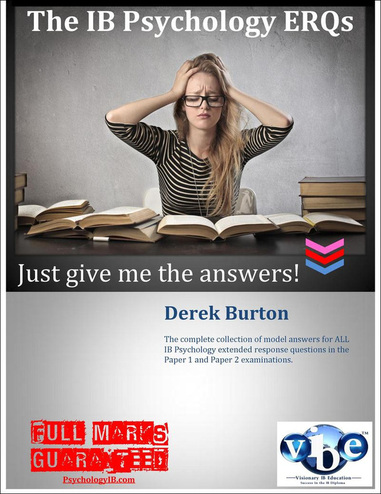All of the text in dark blue font is an example of critical thinking in IB Psychology (you will need to see the embedded PDF, or download it). The flags and the corresponding comments are clarifications of why this is a good example of critical thinking.
Notice in the IB Psychology ERQ that three pieces of research (studies and/or theories) are used to make the argument - but then there are two paragraphs that take a holistic approach to the question. This is the "discussion" which is what the command term is asking the student to develop in the essay response.
Discuss the role of communication in the maintenance of relationships.
Research by Bradbury & Fincham found that couples engage in "relationship enhancing strategies" - that is, when a partner attributes good things to the disposition of their partner, and bad things to situational factors. This helps to maintain the relationship because it can enhance the sense of self-esteem of the partner. Couples in crisis tend to use distress-maintaining patterns - that is, they attribute good things to situational factors and bad things to disposition - meaning that the partner is unlikely to change. Although Bradbury & Fincham have documented this trend in relationships, it is difficult to determine if this is a cause or a symptom of the health of a relationship.
Gottman argues that it is not what we say, but how we say it. Our facial expressions communicate how we really feel about our partners. Gottman has couples come into his lab and then he codes their facial expressions under two conditions – discussing a non-threatening topic and discussing a controversial topic. Gottman argues that there are four “horses of the apocalypse” that help to predict if a relationship will end: criticism, defensiveness, contempt and stonewalling. Gottman argues that if a partner shows contempt during a discussion, this is a sign that the relationship is heading for divorce. One of the problems with this research, however, is that when Gottman tells couples that they are expressing these emotions, it may lead to a self-fulfilling prophecy. In addition, most of the couples that come to him for help are already in severe crisis. This may mean that the high predictive validity of his research has more to do with the fact that at least one of the partners may have already decided to end the relationship.
A final way that we use communication in relationships is disclosure – or the sharing of personal information with a partner. This is the basis of Social Penetration theory. This builds trust. Research has shown that we like people who disclose personal information. Although this seems logical, it is difficult to determine a cause and effect relationship between disclosure and the health of a relationship. It may be more likely that disclosure is the result of a healthy relationship than the cause of one.
There are many concerns about the study of the role of communication in relationships. First, how does a psychologists “observe” communication in a relationship? Often self-reported measures are used – such as a questionnaire – to determine what the normal communication patterns are. This is difficult because the actual communications cannot be verified, so it is up to the perception of the person filling out the questionnaire. The information is open to distortion, especially if there is anger between the two partners. It can also be open to distortion if questions are asked about the history of the relationship. The peak-end rule argues that we tend to remember the most recent part of our relationship (the end) and specific events that stand out as rather exceptional (the peak). So, if the relationship is in bad shape, then the partners may only think about recent communication and this may distort their perception of the way that they have communicated throughout the relationship.
Another question is who is actually studied. A lot of the research done on communication is done on couples that are struggling with their relationship. Although some prospective research is now being done, traditionally it has been done with couples in counselling. Research should be done that looks at couples from the beginning of their relationship to truly measure how communication affects relationships long-term. It is also possible that although it is usually done with couples having problems, that the sample is also biased in other ways. A lot of the research is done on Western couples. In addition, the couples seek counselling, which may indicate a certain level of education or socioeconomic status. Finally, there is the problem of bidirectional ambiguity – that is, we cannot tell if the communication style leads to the quality of the relationship, or vice versa. It could be that there is a correlation, but no causation in either direction. Most importantly, the way we communicate is only one facet of a relationship. It is a reductionist approach to assess the health of a relationship only on communication styles.
The study of communication has led to successful strategies in marriage counselling that have helped people save their marriage by becoming more aware of how and what they say. However, labs like Gottman’s may communicate information to a couple – such as, she actually finds him disgusting – that may help to end the relationship. In this sense, the psychologist may validate one or both partners’ perceptions of the state of the relationship and decide to get divorced. Clearly more research is necessary.


 RSS Feed
RSS Feed